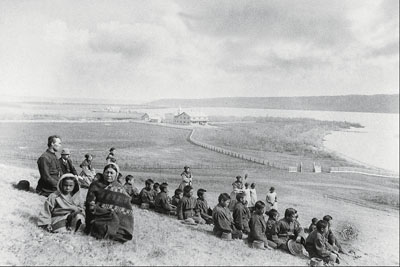Browse "People"
-
Article
René-Robert Cavelier de La Salle
René-Robert Cavelier de La Salle, would-be Jesuit, fur trader, explorer, intriguer, discoverer of the Mississippi delta (b at Rouen, France 21 Nov 1643; assassinated 19 Mar 1687 in Texas).
"https://d2ttikhf7xbzbs.cloudfront.net/media/media/719a5a9d-e031-496a-a4d4-2555d667b686.jpg" // resources/views/front/categories/view.blade.php
https://d2ttikhf7xbzbs.cloudfront.net/media/media/719a5a9d-e031-496a-a4d4-2555d667b686.jpg
-
Article
René Simard
René Simard, singer, performer and TV host (b at Chicoutimi 28 Feb 1961). Born into a large family, he was taken on by impresario Guy Cloutier at the tender age of ten. His first recording, L'oiseau, had phenomenal success that propelled him on stage at the PLACE DES ARTS and led to tours in Québec.
"https://development.thecanadianencyclopedia.ca/images/tce_placeholder.jpg?v=e9dca980c9bdb3aa11e832e7ea94f5d9" // resources/views/front/categories/view.blade.php
https://development.thecanadianencyclopedia.ca/images/tce_placeholder.jpg?v=e9dca980c9bdb3aa11e832e7ea94f5d9
-
Article
René Simard
René Simard. Singer, TV show host, b Chicoutimi, Que, 28 Feb 1961. René Simard's father was a choirmaster on Île d'Orléans, where he spent his childhood. At nine René was the prize winner on the program 'Les Découvertes de Jen Roger' (CFTM-TV, Montreal).
"https://development.thecanadianencyclopedia.ca/images/tce_placeholder.jpg?v=e9dca980c9bdb3aa11e832e7ea94f5d9" // resources/views/front/categories/view.blade.php
https://development.thecanadianencyclopedia.ca/images/tce_placeholder.jpg?v=e9dca980c9bdb3aa11e832e7ea94f5d9
-
Article
Renée Claude
Renée Claude, stage name of Renée Bélanger, singer (b at Montréal 3 July 1939). While her early repertoire consisted of French songs, Claude soon became known for her interpretation of songs by Québec writers such as Jean-Pierre FERLAND, Stéphane Venne, Clémence Desrochers and Luc PLAMONDON.
"https://development.thecanadianencyclopedia.ca/images/tce_placeholder.jpg?v=e9dca980c9bdb3aa11e832e7ea94f5d9" // resources/views/front/categories/view.blade.php
https://development.thecanadianencyclopedia.ca/images/tce_placeholder.jpg?v=e9dca980c9bdb3aa11e832e7ea94f5d9
-
Article
Renée Claude
Renée Claude (b Bélanger). Singer, stage actress, b Montreal 3 Jul 1939. Renée Claude studied piano at the École Vincent-d'Indy and took singing lessons with Alphonse Ledoux. In 1955 she won first prize in the program "Découvertes de Billy Munro" on CKVL (Verdun).
"https://development.thecanadianencyclopedia.ca/images/tce_placeholder.jpg?v=e9dca980c9bdb3aa11e832e7ea94f5d9" // resources/views/front/categories/view.blade.php
https://development.thecanadianencyclopedia.ca/images/tce_placeholder.jpg?v=e9dca980c9bdb3aa11e832e7ea94f5d9
-
Article
Renée Maheu(x)
Renée Maheu(x) (née Anctil). Soprano, journalist, biographer (born 14 February 1929 in Québec City, QC; died 19 March 2007 in Cowansville, QC).
"https://development.thecanadianencyclopedia.ca/images/tce_placeholder.jpg?v=e9dca980c9bdb3aa11e832e7ea94f5d9" // resources/views/front/categories/view.blade.php
https://development.thecanadianencyclopedia.ca/images/tce_placeholder.jpg?v=e9dca980c9bdb3aa11e832e7ea94f5d9
-
Article
Renée Martel
(Marie) Renée Martel, Singer (born on 26 June 1947 in Drummondville, QC; died 18 December 2021 in Saint-Hyacinthe). Martel is considered one of the most important country singers in Quebec.
"https://development.thecanadianencyclopedia.ca/images/tce_placeholder.jpg?v=e9dca980c9bdb3aa11e832e7ea94f5d9" // resources/views/front/categories/view.blade.php
https://development.thecanadianencyclopedia.ca/images/tce_placeholder.jpg?v=e9dca980c9bdb3aa11e832e7ea94f5d9
-
Article
Renée Morisset
Renée Morisset. Pianist, teacher, born St-Damien-de-Bellechasse, near Quebec City, 13 Jun 1928, died Québec City 3 May 2009; deuxième prix piano (CMM) 1946, premier prix piano (CMM) 1947.
"https://development.thecanadianencyclopedia.ca/images/tce_placeholder.jpg?v=e9dca980c9bdb3aa11e832e7ea94f5d9" // resources/views/front/categories/view.blade.php
https://development.thecanadianencyclopedia.ca/images/tce_placeholder.jpg?v=e9dca980c9bdb3aa11e832e7ea94f5d9
-
Article
Renee Rosnes
Irene Louise Rosnes, "Renee,"jazz pianist (b at Regina 24 Mar 1962). She studied in Vancouver and Toronto for a career in classical music, but turned to jazz circa 1982 and moved to New York in 1985.
"https://development.thecanadianencyclopedia.ca/images/tce_placeholder.jpg?v=e9dca980c9bdb3aa11e832e7ea94f5d9" // resources/views/front/categories/view.blade.php
https://development.thecanadianencyclopedia.ca/images/tce_placeholder.jpg?v=e9dca980c9bdb3aa11e832e7ea94f5d9
-
Article
Renee Rosnes
Renee (Irene Louise) Rosnes. Pianist, composer, b Regina 24 Mar 1962. Rosnes grew up in North Vancouver with her adoptive family.
"https://development.thecanadianencyclopedia.ca/images/tce_placeholder.jpg?v=e9dca980c9bdb3aa11e832e7ea94f5d9" // resources/views/front/categories/view.blade.php
https://development.thecanadianencyclopedia.ca/images/tce_placeholder.jpg?v=e9dca980c9bdb3aa11e832e7ea94f5d9
-
Article
Rosette Renshaw
Rosette (Rose Madelaine) Renshaw. Teacher, ethnomusicologist, translator, born Montreal 4 May 1920, died New Paltz, NY, 13 Mar 1997; BA (McGill) 1942, B MUS (Toronto) 1944, D MUS (Toronto) 1949. She attended the École Vincent-d'Indy 1936-8 and studied with Alfred Whitehead and Claude Champagne.
"https://development.thecanadianencyclopedia.ca/images/tce_placeholder.jpg?v=e9dca980c9bdb3aa11e832e7ea94f5d9" // resources/views/front/categories/view.blade.php
https://development.thecanadianencyclopedia.ca/images/tce_placeholder.jpg?v=e9dca980c9bdb3aa11e832e7ea94f5d9
-
Article
Representing the Home Front: The Women of the Canadian War Memorials Fund
While they may not have had access to the battlefields, a number of Canadian women artists made their mark on the visual culture of the First World War by representing the home front. First among these were the women affiliated with the Canadian War Memorials Fund, Canada’s first official war art program. Founded in 1916, the stated goal of the Fund was to provide “suitable Memorials in the form of Tablets, Oil-Paintings, etc. […], to the Canadian Heroes and Heroines in the War.” Expatriates Florence Carlyle and Caroline Armington participated in the program while overseas. Artists Henrietta Mabel May, Dorothy Stevens, Frances Loringand Florence Wyle were commissioned by the Fund to visually document the war effort in Canada.
"https://d2ttikhf7xbzbs.cloudfront.net/media/media/c5bd4814-1974-4a38-b0bf-006c4ec26687.jpg" // resources/views/front/categories/view.blade.php
https://d2ttikhf7xbzbs.cloudfront.net/media/media/c5bd4814-1974-4a38-b0bf-006c4ec26687.jpg
-
Article
Reserves in New Brunswick
There are 31 reserves in New Brunswick held by 15 First Nations (see alsoFirst Nations in New Brunswick). These First Nations belong to one of two larger cultural groups, namely the Mi’kmaq or Wolastoqiyik (Maliseet), who are, in turn, part of the Wabanaki Confederacy. Reserve names and boundaries have changed through time and some reserves either no longer exist or are not recognized by the provincial government. As of 2021, there were 16,985 Registered Indians in New Brunswick, about 59 per cent of whom lived on reserves.
"https://d2ttikhf7xbzbs.cloudfront.net/ReservesinNB/PotatoPickers.jpg" // resources/views/front/categories/view.blade.php
https://d2ttikhf7xbzbs.cloudfront.net/ReservesinNB/PotatoPickers.jpg
-
Article
Reserves on Prince Edward Island
There are four reserves on Prince Edward Island, held by two First Nations (see also First Nations on Prince Edward Island). Three of these reserves, Morell, Rocky Point and Scotchfort, are held by Abegweit First Nation, while Lennox Island is held by Lennox Island First Nation. PEI is just one of two provinces, the other being Nova Scotia, that is part of the traditional territory of only one Indigenous people. In both cases, it is the Mi'kmaq. Of PEI’s 1,405 registered Mi'kmaq (2021), 615 live on the four reserves. The reserves vary in size from less than 1 km 2 to 5.4 km2. Both Lennox Island and Abegweit First Nations are headed by Chiefs, who are required to live on-reserve, and Councillors, who may live on- or off-reserve. Elections are held in a three-year and four-year cycle, respectively.
"https://d2ttikhf7xbzbs.cloudfront.net/media/new_article_images/ReservesonPEI/LennoxIslandChildren.jpg" // resources/views/front/categories/view.blade.php
https://d2ttikhf7xbzbs.cloudfront.net/media/new_article_images/ReservesonPEI/LennoxIslandChildren.jpg
-
Article
Residential Schools in Canada (Plain-Language Summary)
In the early 1600s, Catholic nuns and priests established the first residential schools in Canada. In 1883, these schools began to receive funding from the federal government. That year, the Government of Canada officially authorized the creation of the residential school system. The main goal of the system was to assimilate Indigenous children into white, Christian society. (See also Inuit Experiences at Residential School and Métis Experiences at Residential School .) (This article is a plain-language summary of residential schools in Canada. If you are interested in reading about this topic in more depth, please see our full-length entry Residential Schools in Canada.)
"https://d2ttikhf7xbzbs.cloudfront.net/media/media/8d3d94d2-cb82-47ad-97a5-a70b351c44e4.jpg" // resources/views/front/categories/view.blade.php
https://d2ttikhf7xbzbs.cloudfront.net/media/media/8d3d94d2-cb82-47ad-97a5-a70b351c44e4.jpg
